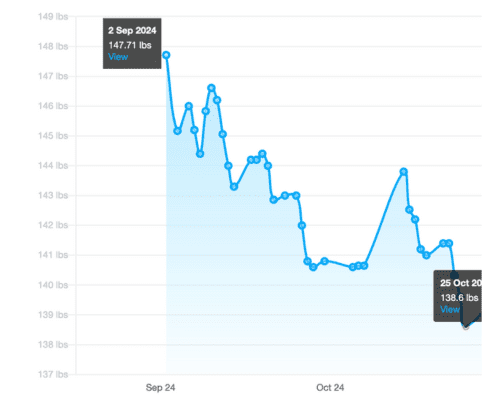Is Diet More Important For Weight Loss Than Exercise?
Jan 10, 2019 by Michael Fouts
Read time: 4 min.
I’m sure many of you have heard the saying: “You can’t out-train a poor diet.” This is partially true, but I still commonly get asked the question: what’s more important when trying to lose weight, diet or exercise?
The answer is: it depends, but the answer is almost always that diet plays the biggest role.
To understand this better we need to look at the balance of ‘Energy In” versus “Energy Out” and how exercise and diet influence this.
“Energy In” should be fairly intuitive, whatever you eat and drink is “Energy In.” In other words your diet. “Energy out” Is largely determined by:
- Your Basal Metabolic Rate (BMR), which is the amount of energy, in the form of calories, your body needs to sustain itself; think of this as the amount of calories you need if you were to lay in bed all day. Your BMR will be lower if: you have low amounts of lean muscle, weigh less, are shorter, are female, and if you are older.
- Non-exercise activity thermogenesis (NEAT), which is a fancy way of saying the amount energy that you need for doing daily tasks – non-planned exercise. For some this is higher than others, for example think of how active a brick-layer is versus a bank teller.
- Exercise activity thermogenesis (EAT) = the amount of energy burned from planned exercise, like when you workout.
- Thermic effect of food (TEF). This is the energy needed for you to digest food, but is relatively small (5-10%).
Let’s use a hypothetical “Jane Doe” to help you understand things further.
Jane has hired a Personal Trainer from OverHaul Fitness, a smart move, to help her lose weight. Some background information on Jane: she is in her mid-forties, 180 lbs, 5’5, an office worker that spends most of her day seated at a desk, and she isn’t currently exercising. For the sake of this example, we’re going to assume Jane’s maintenance intake is 2000 calories per day. Said differently, her energy output (BMR + NEAT + EAT + TEF ) is 2000 calories; if she were to consistently consume 2000 calories each day she wouldn’t gain weight.
After a thorough process of lifestyle assessment and goal planning, Jane and her trainer agree to focus on a goal of 0.25-0.5% (~0.5-1.0 lb.) bodyweight weight loss per week. Theoretically there are 3500 calories in 1 lb, therefore she needs a 1750-3500 caloric deficit per week. To achieve that, I’ve added in possible calories from each in blue, her weekly plan is to:
- Workout twice with the Trainer (700, ~250-500/ hour exercise – range dependent on workout intensity)
- Go for 3x 30-minute walks (roughly 300)
- Track her food intake with MyFitnessPal 3x per week with a daily goal of 1500 calories. Her trainer will review the food logs weekly with her, and the Trainer has instructed her to think of the daily intake more like a weekly budget of 1500 x 7 days, where you can have a lower day to balance a higher and vice versa. Her trainer also gave her a sample meal plan as a resource to use. (-500 x 7 = -3500)
- Take the stairs at work instead of the elevator, walk to the grocery store instead of drive (she lives 5 blocks away). (roughly 300 over the course of the week)
You should see in the above planning that “Energy In” is reduced and “Energy Out” is increased through increasing EAT and NEAT. Total caloric change:
- Calories from “Energy Out” changes: +1300
- Calories from “Energy In” changes: -3500
- Cumulative = 4800 calorie deficit per week.
Why 4800 cumulative, and not the initial 1750-3500 (0.25-0.5% body weight) as indicated in the initial planning? Flexibility. Having a little excess, if it’s not too demanding, will help have some added flexibility to help with short and long-term adherence; short adherence meaning she can indulge here and there and it won’t hurt her progress too much, which will help her stick with the diet and increase her long-term adherence.
With Jane, it should be evident that changing the “Energy In” / her diet has a much larger impact in helping her lose weight. That doesn’t mean she shouldn’t exercise, the best strategy includes the use of diet and exercise.
For argument’s sake, let’s use myself as an example. I’m not going to go into detail on all that’s been listed above, suffice it to say that I exercise a lot. Also, I like exercising – which is an important distinction – so, I’d rather exercise more instead of dieting. In a given week, I could easily burn 3500 calories from exercising. So, If I ate my maintenance intake + used 3500 calories from exercise that would result in 1 lb. of weight loss.
I’ll finish off this post the way I started this post. What’s more important when trying to lose weight, diet or exercise? It depends, but the answer is almost always that diet plays the biggest role.
Till next time,
-Mike
Interested In Being A Client?
Click Here and fill out a quick interest form and we’ll be in touch!
Or…Stay In Touch
Join everyone else that we email, no more than once per month, to keep in touch about recent blog posts, new workout programs, meal plans and recipes to try, and more…






